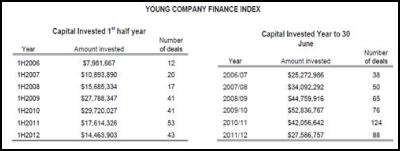Slow But Steady Amid Economic Uncertainty
Slow But Steady Amid Economic Uncertainty
Media Release: 28 August 2012 Angel investors are tending to support their existing portfolio companies rather than investing into new start-ups, New Zealand Venture Investment Fund chief executive Franceska Banga said today. Releasing the latest Young Company Finance Index, Franceska Banga said that investment activity remains high in terms of deals completed but investor caution has contributed to an 18 percent fall in the amount invested between the first half of 2012 and the same period the previous year.
Angels invested $14.5 million across 43 deals involving young New Zealand companies in the first half of 2012. In the first six months of 2011, $17.6 million was invested across 53 deals. In the 12 months to 30 June 2012, $27.6 million was invested into young companies, down a third from the previous year’s $42 million. Angel Association executive director Suse Reynolds took heart that the level of activity remained high, noting that strained economic times often spurred entrepreneurial activity, produced competitive valuations and saw investors want to play a more active role in managing their investments. She said the drop in the amount invested can be attributed to a number of factors.
“We are seeing investor caution in the wake of overseas economic uncertainty, particularly in Europe. Another factor is the absence of new venture capital funds emerging between 2007 and 2011 to provide follow-on investment. Many angel investors have been supporting their existing companies rather than investing in new companies and adding to their portfolios.
“Two new venture capital funds have been established in the past year and are now investing, which should improve the flow of growth capital for angel-backed companies.” Franceska Banga said that notwithstanding the slowdown, the angel investment market is now an important part of New Zealand’s capital markets.
“Cumulatively, $234.6 million has now been invested into young companies by angels since the Young Company Finance Index began in 2006. We are seeing angel-backed companies, like Booktrack and GreenButton, show considerable promise. “Half of all angel investment is being shared between software start-ups and pharmaceutical/ biotechnology start-ups. Over the last four years, software start-ups have consistently received around 30 percent of angels’ investment and pharmaceuticals and bio-tech startups receive about a fifth. “Auckland, which is home to a number of angel investment networks, is where over half of the investment is made. Start-ups in Wellington, Christchurch and Dunedin each see about 10 percent of the investment, followed by Palmerston North and Hamilton. This reflects the regions where universities, research institutes and incubators are located.”
Of the $14.5 million invested in the last six months, 63 percent ($9m) was follow-on investment and 37 percent ($5.5m) was new investments. (In the first half of 2011, 54 percent was follow-on and 46 percent was new.) In terms of the stage of investment, $8 million was seed investment, $5.8 million was at the start-up stage, and $0.75 million at the early expansion level.
The first half of 2012 saw 72 percent of deals syndicated between different angel groups – the highest level recorded - with 28 percent of deals not syndicated. Suse Reynolds said this is an indication of the maturity of New Zealand’s networks whose members appreciate the value of pooling their access to capital, skills and connections. In terms of the type of investments angels are making in 2012, 26 percent of investments were convertible loans, 42 percent were ordinary shares, and 32 percent were preference shares. Since 2006, by region, 53 percent of investment was in Auckland, 10 percent in Christchurch, 9 percent in Wellington, 9 percent in Dunedin, 6 percent in Palmerston North, and 5 percent in Hamilton. Software & services received 27 percent of the amount invested, followed by pharmaceuticals/life sciences technology (23%), hardware and equipment (14%), and food and beverage (10%).
Young_Company_Finance_Issue_13_August_2012.pdf

Click for big version.
ENDS


 Electricity Networks Association: How Many More Trees Need To Fall On Power Lines Before The Rules Change?
Electricity Networks Association: How Many More Trees Need To Fall On Power Lines Before The Rules Change? Parrot Analytics: Netflix Earnings - Price Hikes With Minimal Churn | Will Netflix Be A Bright Spot For Markets?
Parrot Analytics: Netflix Earnings - Price Hikes With Minimal Churn | Will Netflix Be A Bright Spot For Markets? Canterbury Museum: Mystery Molars Lead To Discovery Of Giant Crayfish In Ancient Aotearoa New Zealand
Canterbury Museum: Mystery Molars Lead To Discovery Of Giant Crayfish In Ancient Aotearoa New Zealand Ngā Pae o te Māramatanga: Māori Concerns About Misuse Of Facial Recognition Technology Highlighted In Science
Ngā Pae o te Māramatanga: Māori Concerns About Misuse Of Facial Recognition Technology Highlighted In Science Retail NZ: Retailers Call For Flexibility On Easter Trading Hours
Retail NZ: Retailers Call For Flexibility On Easter Trading Hours WorkSafe NZ: Worker’s Six-Metre Fall Prompts Industry Call-Out
WorkSafe NZ: Worker’s Six-Metre Fall Prompts Industry Call-Out



